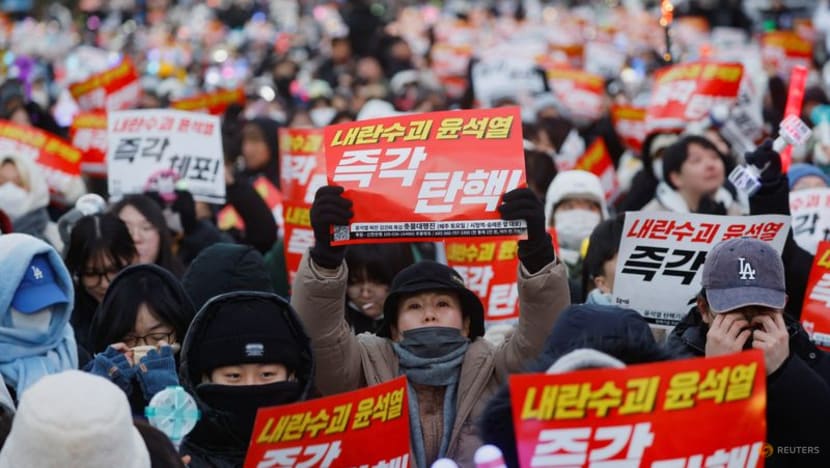Commentary: President Yoon’s actions have tarnished South Korea’s international reputation
South Korean President Yoon Suk Yeol plunged the country into chaos at a time when a little bit of stability, anywhere, would be nice, says Karishma Vaswani for Bloomberg Opinion.

Protesters hold banners calling for the impeachment of South Korean President Yoon Suk Yeol, who declared martial law, which was reversed hours later, near the National Assembly in Seoul, South Korea, Dec 8, 2024. (Photo: Reuters/Kim Soo-hyeon)
SINGAPORE: South Korea’s President Yoon Suk Yeol has terrible timing. His declaration of martial law has tested the resilience of his country’s democracy, at a time when the economy is under pressure, and North Korea’s leader Kim Jong Un has been furthering his nuclear weapons ambitions. A little stability would have been nice.
Yoon managed to avoid impeachment over the weekend by just a handful of votes, but pressure for him to step down is intensifying. On Monday (Dec 9), the justice department banned the president from travelling overseas, while he is under investigation for leading an insurrection. Beyond this turmoil, he is facing a number of challenges to an economy already in jeopardy.
At home, unionised workers at auto factories, railroads, public schools and hospitals are saying they won’t go to work if Yoon doesn’t step down. Another group plans to hold a candlelight vigil everyday in front of parliament to get the president to resign.
This could be a huge potential blow to the trade-reliant economy, at a time when it is already struggling with slower exports and a declining growth rate.
Since taking office in 2022, Yoon has steered South Korea away from economic dependence on China and boosted trade ties with the US, its main security treaty ally.
Putting aside historical tensions with Japan, he’s pushed for closer military, diplomatic and economic ties with Tokyo, part of President Joe Biden’s push to build a network of partners to help combat Beijing’s increased assertiveness in the region. But those relationships are now under pressure in the leadup to Yoon’s inevitable, messy exit.
A LEADERSHIP VACUUM
Internationally, things are complicated, too. The political crisis, now in its second week, will dilute the government’s ability to navigate difficult foreign policy issues and to address outstanding national security threats from across the border.
It is a precarious picture. There’s a war in Ukraine, a crisis in the Middle East, and now the rebuilding of Syria. China has launched military exercises in the waters around Taiwan this week, a timely reminder of the potential of a conflict breaking out in the Strait.
Skirmishes escalating in the South China Sea between Beijing and Manila are also worrying Asian policymakers. And there’s always the prospect of Kim Jong Un launching new missiles over South Korea and Japan, the most recent in November just hours ahead of the US election.
A leadership vacuum in South Korea is the last thing Washington needs right now. A July report from the Commission on the National Defense Strategy determined the US is facing a growing anti-American alliance unhappy with the status quo.
“China and Russia are major powers that seek to undermine US influence,” it notes. “They want more control over their regions than they now have.”
South Korea’s Ministry of National Defence confirmed that the president retains command of the armed forces. That means in the event of any foreign policy incidents, including a possible threat from North Korea, Yoon is still able to make executive decisions.
Still, it’s hardly the image of a well-run country, at a time when the deepening relationship between Pyongyang and Moscow is also a new headache for Seoul, as Chung Min Lee, senior fellow for the Asia program at the Carnegie Endowment of International Peace notes.
In return for the use of Pyongyang’s soldiers, Russia may feel obliged to transfer more modern weapons to North Korea, such as advanced combat jets and missile technologies.
A weakened government just as more North Korean soldiers join the fight alongside Russia in the Ukrainian war, and the potential for worsening US-China trade wars as Donald Trump prepares to re-enter the White House, will both have critical ramifications for Seoul, he adds.
SOUTH KOREA’S REPUTATION TARNISHED
Yoon’s vanishing political capital following his brief declaration of martial law has diminished South Korea’s growing brand as a responsible player in global affairs. It has had its fair share of flipflopping, both in terms of policy as well as presidents, but it is still considered a strategic and reliable partner for Washington and Tokyo in the region.
That reputation has now been tarnished by the president’s cynical actions.
The opposition is exploiting the situation for its own benefit. On Tuesday, the leader of the Democratic Party of Korea, Lee Jae-myung, sought to force through a highly contested budget in a show of political clout designed to put even more pressure on Yoon ahead of another impeachment vote.
Rather than use this moment for political gain, parties should work together to ensure the country keeps running smoothly and protests don’t expand to paralyse institutions as they did in 2016 during the impeachment of former president Park Geun-hye.
Voters should be reassured that they can trust the resilience of their core institutions. One of the key priorities will be ensuring that national security issues remain stable until difficult political impasse is resolved. Working with the new Trump administration, but also leveraging the goodwill Seoul has built with Tokyo, would be a sensible approach.
Yoon’s miscalculations have put South Koreans at risk, and they face considerable political instability ahead. Their experience is a stark reminder: Democracy is always a work in progress.














